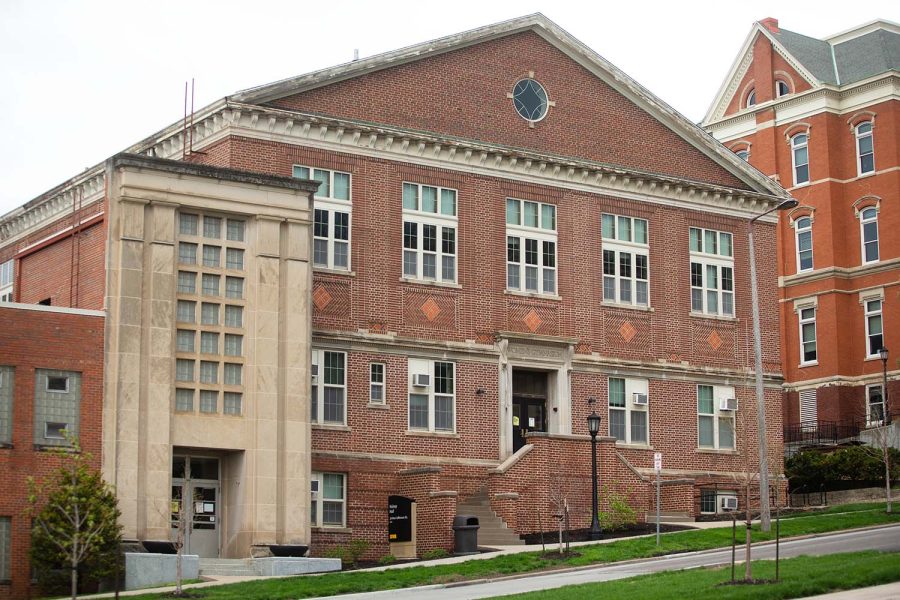UI to offer new Social Justice and Performing Arts certificate program
While the University of Iowa has offered social justice programs in the past, several departments have made the decision to collaborate and offer a new certificate that formally combines Social Justice and Performing Arts.
Halsey Hall at the University of Iowa is seen on Saturday, April 30, 2022. Halsey is where a majority of dance classes are held.
May 2, 2022
From theatrical productions to choreographed routines, the connection between social justice and the performing arts exists in nearly every discipline of art.
While the University of Iowa has offered social justice programs in the past, it will now offer a new certificate that formally combines those two ideas.
Loyce Arthur, associate professor of design and one of the organizers of the certificate program, said that the new social justice and performing arts certificate program provides opportunities for students with both interests to hone their skills. She said the relationship between the previous social justice programs and the performing arts was limited.
“We all thought that it would be a good idea to make that even more specific, where it could really be a concentration, rather than, say, one or two courses that a student takes with the [other] certificate,” Arthur said.
Arthur said that the program also provides students with collaborative experiences that have the potential to heighten their work. Dream City and Public Space One are both community art centers in Iowa City that focus on advocacy and well-being, and Arthur said those two locations can work with students pursuing the new certificate.
Theatre Without Borders is another program that Arthur said could provide resources for students. The global organization supports an international exchange of theater, and Arthur said it seeks to build relationships for students to produce the work they want.
“It’s one thing to do a play that has those themes, it’s another thing to actually produce that kind of work,” Arthur said. “We’re interested in making sure that people have a venue to produce that kind of work — to come together in partnerships with other like-minded people, and to learn what that is to do those kinds of collaborations.”
RELATED: ‘BLKS’ to close UI Theatre spring mainstage season
The new certificate encompasses several different forms of performing arts, including dance, theater, and music. Race and ethnicity in the U.S., gender, women’s, and sexuality studies, global and transnational studies, and the environment and ecological justice are the broad categories students can explore through art.
Arthur said that the classes required with this new certificate program will allow students to be prepared for difficult conversations associated with social justice work. She said that foundational background courses will give students specific instruction on their chosen topics of interest. Those courses will then allow students to extrapolate those ideas through their chosen medium.
“Part of what we’re saying is that if you want to do social justice work, if you want to do work at community engagement work or work in a community, there’s certain skill sets that you need that are involved in the courses,” Arthur said. “There are conversations that you need to have. There’s background that you need to have before you do this kind of work.”
Theatre Department Chair Mary Beth Easley, who aided in the pioneering of the certificate program, said that performing arts and social justice are essentially intertwined.
“I think sometimes we listen more carefully when we hear a story because our whole life is about stories, and we relate to those stories,” Easley said. “A lot of times by hearing this story or having empathy for the way someone else is living, or what’s going on with them, causes us to take action to be able to do something.”
Easley said that the conversations for this program were initiated in response to the murder of George Floyd in May of 2020. She said the Black Lives Matter movement is one of the avenues that has been explored through various forms of artwork.
RELATED: ‘Oracles of Iowa City’ murals reimagine double consciousness
Among the various social justice movements that are present today, Easley said that the timing for this program is ideal. Students have a desire to produce work that can make a change and bring awareness to certain topics, Easley said, and the new program is intended to allow that to occur.
“I think it’s the right time for it,” Easley said. “I think there’s a lot of students on campus who are looking for outlets and structure for those outlets, and this is a way in which it can help them.”



